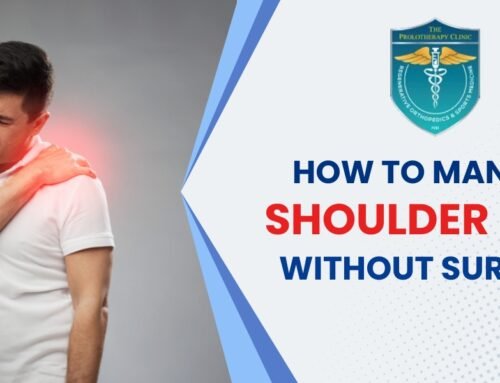Shoulder pain is a common complaint that can significantly impact daily activities and overall quality of life. The shoulder is a complex joint with a wide range of motion, making it susceptible to various types of injuries and conditions. Understanding the signs that indicate it’s time to consult a doctor can help in managing the pain effectively and prevent further complications. In this comprehensive guide, we will explore the causes of shoulder pain, key signs that require medical attention, and the importance of timely intervention.
Common Causes of Shoulder Pain
Shoulder pain can arise from a variety of sources, including injuries, overuse, and underlying medical conditions. Some of the most common causes include:
- Rotator Cuff Injuries: The rotator cuff is a group of muscles and tendons that stabilize the shoulder joint. Injuries to the rotator cuff, such as tears or tendinitis, can cause pain and limit mobility.
- Shoulder Impingement Syndrome: This occurs when the tendons of the rotator cuff become compressed or pinched, leading to inflammation and pain.
- Frozen Shoulder (Adhesive Capsulitis): This condition is characterized by stiffness and pain in the shoulder joint, resulting in a reduced range of motion.
- Shoulder Bursitis: Inflammation of the bursa, a small fluid-filled sac that cushions the shoulder joint, can lead to pain and swelling.
- Labral Tears: The labrum is a cartilage ring that helps stabilize the shoulder joint. Tears in the labrum can cause pain, clicking, and instability.
- Shoulder Fractures: Fractures in the clavicle (collarbone) or humerus (upper arm bone) can result in severe shoulder pain and functional impairment.
When to Seek Medical Attention for Shoulder Pain
Not all shoulder pain requires immediate medical intervention, but certain symptoms and conditions indicate the need for professional evaluation. Below are key signs that suggest it’s time to consult a doctor:
Persistent or Worsening Pain
If shoulder pain persists for more than a few days or intensifies despite rest and over-the-counter pain medications, it is essential to seek medical advice. Persistent pain may indicate an underlying issue that requires professional diagnosis and treatment.
Pain Accompanied by Numbness or Tingling
Shoulder pain accompanied by numbness or tingling in the arm or hand may be a sign of nerve involvement or a more serious condition. Conditions such as cervical radiculopathy, where nerve roots in the neck are compressed, can cause these symptoms and necessitate medical evaluation.
Limited Range of Motion
Experiencing a significant reduction in the range of motion in the shoulder joint, especially if it affects daily activities, should prompt a visit to the doctor. Limited mobility may be a sign of conditions such as frozen shoulder or rotator cuff injuries.
Pain Following Trauma or Injury
Shoulder pain that develops after a fall, sports injury, or any form of trauma should be assessed by a healthcare professional. Trauma-related pain may indicate fractures, dislocations, or other serious injuries that require immediate attention.
Signs of Infection
If shoulder pain is accompanied by symptoms such as fever, redness, swelling, or warmth around the joint, it could be a sign of an infection, such as septic arthritis or cellulitis. Infections require prompt medical treatment to prevent complications.
Difficulty Performing Routine Activities
If shoulder pain interferes with basic activities such as lifting objects, reaching overhead, or performing tasks that require shoulder movement, it is crucial to consult a doctor. This may indicate a significant impairment that needs professional assessment and intervention.
Unexplained Weight Loss or Systemic Symptoms
Shoulder pain associated with unexplained weight loss, fatigue, or systemic symptoms like night sweats could be indicative of more severe conditions such as cancer or systemic diseases. These symptoms warrant a thorough medical evaluation to rule out serious underlying issues.
Diagnosis and Treatment
When you consult a doctor for shoulder pain, they will conduct a comprehensive evaluation to determine the underlying cause. This may include:
- Medical History and Physical Examination: The doctor will review your medical history, ask about the onset and nature of the pain, and perform a physical examination to assess range of motion, strength, and tenderness.
- Imaging Studies: Diagnostic imaging such as X-rays, MRI, or ultrasound may be used to visualize the shoulder joint, identify structural abnormalities, and assess the extent of any injuries.
- Laboratory Tests: Blood tests may be ordered to check for signs of infection or inflammation if there are concerns about systemic conditions.
Treatment for shoulder pain varies depending on the diagnosis and may include:
- Medications: Pain relievers and anti-inflammatory drugs can help manage pain and reduce inflammation.
- Physical Therapy: Targeted exercises and rehabilitation programs can improve shoulder strength, flexibility, and function.
- Injections: Corticosteroid or hyaluronic acid injections may be used to reduce inflammation and provide pain relief.
- Surgery: In cases of severe injuries or conditions that do not respond to conservative treatments, surgical intervention may be necessary.
Preventing Shoulder Pain
Preventing shoulder pain involves maintaining shoulder health and adopting practices that reduce the risk of injury. Consider the following tips:
- Strengthen Shoulder Muscles: Regular exercises that strengthen the shoulder muscles and improve stability can help prevent injuries.
- Practice Good Posture: Proper posture reduces strain on the shoulder joint and helps prevent discomfort.
- Use Proper Techniques: When engaging in physical activities or lifting heavy objects, use proper techniques to avoid undue stress on the shoulder.
- Take Breaks: If your activities involve repetitive shoulder movements, take regular breaks to rest and prevent overuse injuries.
Get the Best Shoulder Pain Treatment At The Prolotherapy Clinic
If you are experiencing shoulder pain consult with Dr. Vikram Rajguru at The Prolotherapy Clinic in Pune for effective treatment. Shoulder pain can greatly impact daily activities, making it important to recognize signs that warrant a professional evaluation. Look out for persistent pain, limited range of motion, or symptoms like numbness or infection. Early intervention can not only prevent complications but also enhance your overall shoulder health. Don’t let shoulder pain disrupt your life—seek expert care today.




